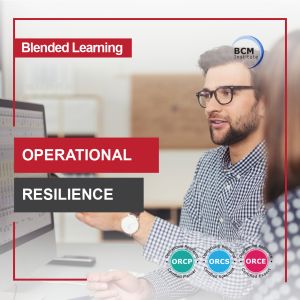Difference between revisions of "Business Resilience"
| Line 1: | Line 1: | ||
{| style="margin-left: 0px; text-align: left; font-style: none; width:100%; font-weight: none; background: #F0F0F0; border:1px " | {| style="margin-left: 0px; text-align: left; font-style: none; width:100%; font-weight: none; background: #F0F0F0; border:1px " | ||
| − | |'''1.''' Business | + | |'''1.''' Business resilience is an organisation's ability to anticipate, prepare for, respond to, and adapt to disruptions that threaten its operations, reputation, and overall success. It's the capacity to absorb shocks, recover quickly, and emerge stronger from challenging situations. |
| + | |||
{{Template:BL-OR-5 banner}} | {{Template:BL-OR-5 banner}} | ||
<br>'''Related Term''': [[Operational Resilience| Operational Resilience]], [[Organizational Resilience| Organizational Resilience]], [[Business_Continuity_Management (BCM)|Business Continuity Management (BCM)]], [[Business Resilience| Business Resilience]]<br/> | <br>'''Related Term''': [[Operational Resilience| Operational Resilience]], [[Organizational Resilience| Organizational Resilience]], [[Business_Continuity_Management (BCM)|Business Continuity Management (BCM)]], [[Business Resilience| Business Resilience]]<br/> | ||
| Line 31: | Line 32: | ||
| − | '''2.''' Ability of an organization to resist being affected by an incident. | + | '''2.''' the ability of an organization to absorb and adapt in a changing environment to enable it to deliver its objectives and survive and prosper. |
| + | {{22316 Source}} | ||
| + | |||
| + | '''3.''' Ability of an organization to resist being affected by an incident. | ||
{{NCEMA 7000 Source}} | {{NCEMA 7000 Source}} | ||
| − | ''' | + | '''4.''' Ability of an organization to resist being affected by an event. |
{{ISO 22399 Source}} - clause 3.31 | {{ISO 22399 Source}} - clause 3.31 | ||
| − | ''' | + | '''5.''' The ability of an [[organization]] to resist being affected by an incident. |
{{BS25999 Source}} | {{BS25999 Source}} | ||
| − | ''' | + | '''6.''' The ability of an [[organization]] to absorb the [[impact]] due to a [[risk]] occurrence and to continue to operate in such a way as to achieve its [[Minimum Business Continuity Objective (MBCO)|Minimum Business Continuity Objective]]. |
{{TR19 Source}} | {{TR19 Source}} | ||
| − | ''' | + | '''7.''' The ability of an [[organization]], staff, [[system]], network, activity or [[process]] to absorb the [[impact]] of a business interruption, [[disruption]] and/or [[loss]] and continue to provide a minimum acceptable level of service. |
('''Source:''' Business Continuity Institute - BCI) | ('''Source:''' Business Continuity Institute - BCI) | ||
Revision as of 06:08, 17 April 2024
| 1. Business resilience is an organisation's ability to anticipate, prepare for, respond to, and adapt to disruptions that threaten its operations, reputation, and overall success. It's the capacity to absorb shocks, recover quickly, and emerge stronger from challenging situations.
| |||||||||||||||||||||||||||||
2. the ability of an organization to absorb and adapt in a changing environment to enable it to deliver its objectives and survive and prosper.
(Source: ISO 22316:2012)
3. Ability of an organization to resist being affected by an incident. (Source: AE/HSC/NCEMA 7000:2012)
4. Ability of an organization to resist being affected by an event.
(Source: ISO 22399:2007 – Societal Security - Guideline for Incident Preparedness and Operational Continuity Management) - clause 3.31
5. The ability of an organization to resist being affected by an incident.
(Source: British Standard BS25999-1:2006 Code of Practice for Business Continuity Management)
6. The ability of an organization to absorb the impact due to a risk occurrence and to continue to operate in such a way as to achieve its Minimum Business Continuity Objective.
(Source: Singapore Standard 540 - SS 540:2008)
7. The ability of an organization, staff, system, network, activity or process to absorb the impact of a business interruption, disruption and/or loss and continue to provide a minimum acceptable level of service.
(Source: Business Continuity Institute - BCI)


